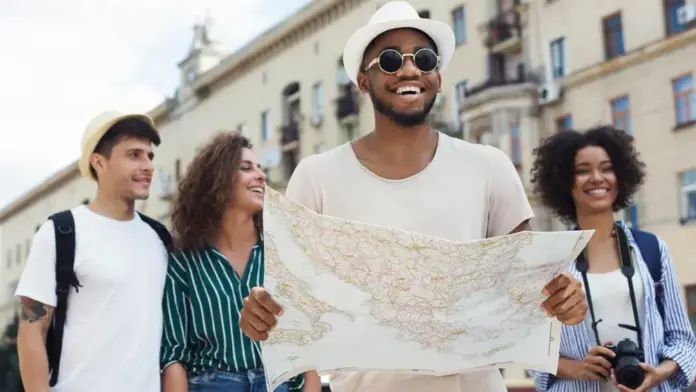Traveling in the United States is more than just sightseeing, it’s about experiencing culture, history, and community. For Black travelers, certain U.S. cities stand out not only for their vibrant attractions but also for their deep ties to Black history, culture, and resilience. From historic Civil Rights landmarks to modern Black-owned businesses shaping the cultural landscape, these destinations offer education, inspiration, and unforgettable experiences. Here are the top 10 travel cities in the USA for Black people in 2025 that blend history, food, art, and culture.
1. Memphis, Tennessee
Memphis is a powerhouse of Black culture, music, and activism. Known as the birthplace of blues and soul, the city continues to pulse with rhythm and resilience.
- Must-visit: The National Civil Rights Museum at the Lorraine Motel, where Dr. Martin Luther King Jr. was assassinated, offers a powerful chronicle of the Civil Rights Movement.
- Cultural stops: Clayborn Temple, I Am a Man Plaza, and murals across the city celebrating Black pride.
- Food & community: Taste legendary Southern soul food at The Four Way, a restaurant that broke racial barriers during the 1960s.
2. New Orleans, Louisiana
No city embodies African American influence on music and food quite like New Orleans. Tremé, the oldest Black neighborhood in the country, remains a hub of jazz, resilience, and cultural preservation.
- Historical landmarks: Congo Square in Louis Armstrong Park, where enslaved people gathered to drum and dance, giving rise to jazz.
- Black-owned experiences: All Bout Dat Tours and businesses like Community Book Center.
- Dining: The iconic Dooky Chase’s Restaurant, once a meeting place for civil rights leaders, still serves world-class Creole cuisine.
3. New York City, New York
Harlem remains a crown jewel of Black heritage in America. The Harlem Renaissance of the 1920s transformed music, literature, and art, and its echoes still resonate across New York.
- Highlights: The Apollo Theater, Schomburg Center for Research in Black Culture, and The Studio Museum.
- Beyond Harlem: Visit the Louis Armstrong House Museum in Queens or stroll down Strivers’ Row, where Harlem’s Black elite once lived.
- Modern Black culture: Harlem’s eateries, jazz lounges, and murals continue to celebrate Black identity.
4. Tulsa, Oklahoma
Tulsa’s Greenwood District, once known as Black Wall Street, is both a place of tragedy and triumph. The 1921 Tulsa Race Massacre destroyed thriving Black businesses, but the district is reclaiming its legacy today.
- Educational sites: Greenwood Rising museum and the Greenwood Cultural Center.
- Cultural resilience: Fulton Street Books & Coffee and Black Wall Street Liquid Lounge embody the entrepreneurial spirit of the district.
5. Montgomery, Alabama
Montgomery is often called the birthplace of the modern Civil Rights Movement. The 1955–56 Montgomery Bus Boycott sparked nationwide change and made Rosa Parks and Dr. King household names.
- Historic experiences: Dexter Avenue Baptist Church, Rosa Parks Museum, and The Legacy Museum.
- Immersive tours: Montgomery Tours with local guides who lived through the Civil Rights era.
- Local eats: Greg’s Breakfast Bar keeps visitors fueled with Southern comfort food.
6. Washington, D.C.
The nation’s capital is also a capital of Black history and culture.
- Essential stop: The National Museum of African American History & Culture (nicknamed the “Blacksonian”) is a must-see, chronicling centuries of Black resilience and creativity.
- Black Broadway: U Street, once a hub of Black nightlife, still thrives with theaters, murals, and the iconic Ben’s Chili Bowl.
- Memorials: Visit the Martin Luther King Jr. Memorial, especially breathtaking at night.
7. Birmingham, Alabama
Birmingham was the epicenter of Civil Rights struggles in the 1960s, making it an essential destination for history seekers.
- Key landmarks: Sixteenth Street Baptist Church (site of the tragic 1963 bombing), the Birmingham Civil Rights Institute, and Kelly Ingram Park.
- Civil Rights District: Visit the restored A.G. Gaston Motel, once a safe haven for Black leaders.
- Why go: Birmingham embodies both the pain of the past and the determination to build a better future.
8. Atlanta, Georgia
Atlanta is often dubbed the “Black Mecca” thanks to its role as a hub for education, entrepreneurship, and activism.
- Historic figures: Dr. King was born here, visit his childhood home, Ebenezer Baptist Church, and The King Center.
- Black excellence: Morehouse and Spelman Colleges continue to produce national leaders.
- Hidden gem: The Madame C.J. Walker Museum honors the first self-made woman millionaire in America, showcasing Black innovation and entrepreneurship.
9. Charleston & South Carolina Low Country
The Low Country (including Charleston, Hilton Head, and Bluffton) is home to the Gullah Geechee people, descendants of West Africans who preserved unique cultural traditions.
- Cultural tours: Gullah Heritage Trail Tours offer insight into Gullah communities, language, and history.
- Historic sites: Mitchelville Freedom Park, the first self-governed town for freed African Americans.
- Cuisine: Gullah food, blending African roots with Southern flavors, can be savored at Ruby Lee’s on Hilton Head Island.
10. Maryland’s Eastern Shore
This region honors Harriet Tubman’s life and legacy through one of the most moving heritage trails in America.
- Scenic journey: The Harriet Tubman Underground Railroad Byway spans 125 miles of historic stops.
- Key attractions: The Harriet Tubman Underground Railroad Visitor Center and Bucktown General Store, where Tubman suffered a life-altering head injury.
- Stay nearby: The Wildset Hotel in St. Michaels offers a modern retreat while exploring this historic region.
Why These Cities Matter for Black Travelers?
These ten cities are more than vacation spots,.they are living classrooms, cultural centers, and vibrant communities where Black history and future meet. By visiting, travelers not only learn about the struggles and triumphs of African Americans but also actively support Black-owned businesses and preservation efforts.
Traveling as a Black person in America isn’t just about leisure, it’s also about connecting with a legacy of resilience, artistry, and empowerment. Whether you’re tasting Creole food in New Orleans, standing in the footsteps of activists in Birmingham, or honoring Harriet Tubman’s courage in Maryland, these destinations invite you to experience the richness of Black culture firsthand.








